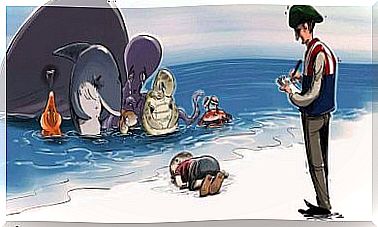The 5 Emotions That Accompany A Personal Crisis

The emotions that accompany a personal crisis can cripple us. This sudden and unexpected break in the present often plunges us into states for which we are not always psychologically prepared. Pain, anxiety, uncertainty, fear… Understanding the role played by these internal realities can help us overcome these moments more effectively.
How to do now ? If there is anything most of us know, it is that when we are involved in a personal crisis, there is little room for reflection and for that mental clarity needed to make good decisions. When adversity arises, fear grows and so be it evolutionarily normal, and even expected.
We must remember that our brain is still governed by very primitive instincts and defense mechanisms. This way, when he perceives and is aware of a threat or the breakdown of our internal homeostasis, this very common response arises: the desire to escape. Fear controls everything and we are barely able to reason with poise and restraint.
However, it is worth dwelling for a moment on what the word “crisis” itself means. This term comes from the Greek and has several meanings which converge on the same idea: decision, judgment, resolution, discernment… All this undoubtedly encourages us to understand a simple aspect. We are forced to overcome fear, to transfer it to allow us to make new decisions and thus begin a new stage.
However, one must first understand the anatomy of the seizure itself and know what kind of emotions it generates.

The 5 emotions that accompany a personal crisis
Albert Einstein said that without a crisis there is no merit. He also stressed that it is in these times when the best can emerge, because in every crisis the wind is like a caress that can encourage us. It undoubtedly sounds evocative and while these ideas inspire and motivate us, it is clear that it is not easy to cope with these moments of instability, uncertainty and fear.
On the other hand, we also know that not all crises are created equal. Some are obvious threats to our psychological and / or physical balance (Goldenberg, 1983). In other cases, it is sudden events that generate changes that force us to emit some kind of response (Rosenbaun & Calhoun, 1977).
On the other hand, the concept of “crisis” is very complex and encompasses many realities, as explained in a study by doctors Donald Coates and Katherine Eastman. These temporary states of alteration and defiance have endless origins and affect any age. In addition, it can be seen in many cases a convergence of the same internal realities.
Here are the emotions that accompany a personal crisis.
1. Fear (I’m not prepared for this, I’m afraid)
Fear is that emotion regulated by our cerebral tonsil. This emotional sentry is responsible for this type of reaction when it detects some kind of threat or unexpected event that breaks the balance we had.
So an emotional breakdown, the loss of a job, a friendship, a family member, or leaving something meaningful to us instantly opens the door to this overwhelming emotion.
2. The 5 emotions that accompany a personal crisis: anger (why does this happen to me?)
Sometimes more than resounding anger, it is outrage and bewilderment. The person who is having a seizure may not help but wonder “why me?”. The fact that this emotion arises is in fact a normal process. It is common to feel this fact with some anger, we refuse to accept it and we even feel misunderstood.
Gradually acceptance will come, but first we will walk this path inhabited by the flames of anger.
3. Resistance to change (I feel helpless, I can’t do anything)
Another emotion that accompanies a personal crisis in its early stages is impotence. Beyond the anger and misunderstandings, there is the idea that we cannot change anything that has happened. If my partner has left me, the world is over for me, I will never be happy again.
If I have lost a parent, the world stops and there is no going back, it’s all over… These ideas are recurrent at the start of a crisis. Ideally, it is not about hanging on to these ideas, but about allowing ourselves to receive help to generate change by assuming new perspectives.

4. The 5 emotions that accompany a personal crisis: shame, discomfort in the personal crisis (I want to get away from everyone and everything)
Some people are ashamed to see themselves in certain situations. Others feel nothing but discomfort and rejection from everyone and everything. It is common in all cases to want a certain isolation, to want to move away from immediate reality in order to be alone with yourself.
Practicing soul-searching is good for a limited time. It helps to rearrange ideas and start the acceptance process. However, we also need to be able to gradually open up emotionally to others.
5. Emotional pain (I feel hurt, helpless, paralyzed…)
We can tell ourselves over and over that pain is a part of life. However, when you live in your own skin, you realize that this is something unfair, unexpected, and too big to take so much pain.
Beyond what we can think, if we accept and acknowledge the existence of this emotional pain to validate it, it will in turn help us promote the right process of psychological adaptation. Gradually letting all of these internal states flow will help relieve suffering and seek new resolutions.
In conclusion, understanding all these emotions that accompany a personal crisis will certainly allow us to shape the muscle of resilience. It is not an easy or quick process. Seizures cannot be cured in a week or a month. We must take those paths where pain is inevitable.
However, with each step, our skin becomes harder. The heart calms down and the mind becomes more flexible, receptive and creative. Sooner or later we will find not only relief, but also new and wonderful ways.









